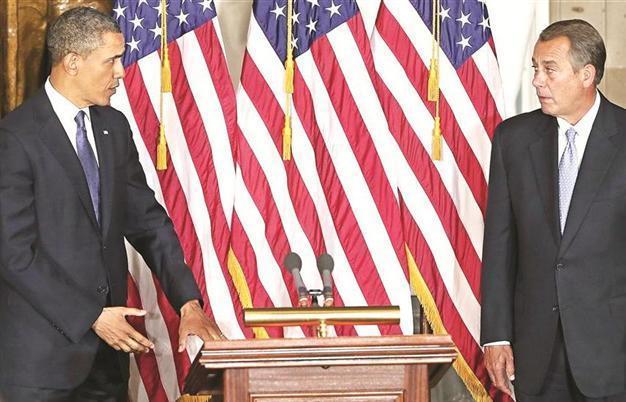Spending cuts endanger Obama’s new term agenda
WASHINGTON - Reuters

US President Barack Obama (L) and Speaker of the House John Boehner (R-OH) take part in a ceremony on Feb 27, in this file photo. AFP photo
Just hours after across-the-board spending cuts officially took effect, U.S. President Barack Obama pressed Congress on March 2 to work with him on a compromise to halt a fiscal crisis that threatens the economy and his broader domestic policy agenda.The failure by Obama and Republicans to agree to halt the $85 billion “sequester” cuts virtually guaranteed that fiscal issues would remain center stage in Washington for weeks, crowding out Obama’s proposals to reform immigration, tighten gun laws and raise the minimum wage.
The economic effects of the spending cuts may take time to kick in, but political blowback has already begun and is hitting Obama as well as congressional Republicans.
Obama’s approval rating dropped to 47 percent in a Gallup poll on Friday, down from 51 percent in the previous three-day period measured.
While most polls show voters blame Republicans primarily for the fiscal mess, Obama could see himself associated with the worst effects of sequestration like the looming furloughs of hundreds of thousands of federal workers. He signed an order on Friday night that started putting the cuts into effect.
In his weekly radio address on Saturday, Obama appealed for Republicans to work with Democrats on a deal, saying Americans were weary of seeing Washington “careen from one manufactured crisis to another.”
But he offered no new ideas to resolve the recurring fiscal fights, and there was no immediate sign of any negotiations.
“There’s a caucus of common sense (in Congress),” Obama said in his address. “And I’m going to keep reaching out to them to fix this for good.”
At the heart of Washington’s persistent fiscal showdowns is disagreement over how to slash the budget deficit and the $16 trillion national debt, bloated over the years by wars in Iraq and Afghanistan and government stimulus for the ailing economy.
The president wants to close the fiscal gap with spending cuts and tax hikes, what he calls a “balanced approach.” But Republicans do not want to concede again on taxes after doing so in negotiations over the “fiscal cliff” at the end of last year.
The president offered a litany of hardships in his radio address he said would flow from the forced spending cuts.
“Beginning this week, businesses that work with the military will have to lay folks off. Communities near military bases will take a serious blow. Hundreds of thousands of Americans who serve their country - Border Patrol agents, FBI agents, civilians who work for the Defense Department - will see their wages cut and their hours reduced,” he said.
















